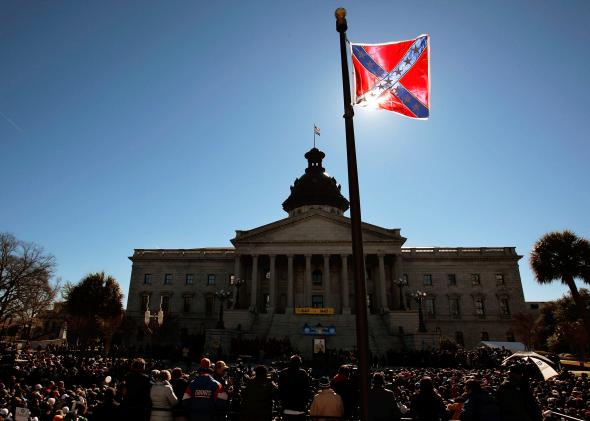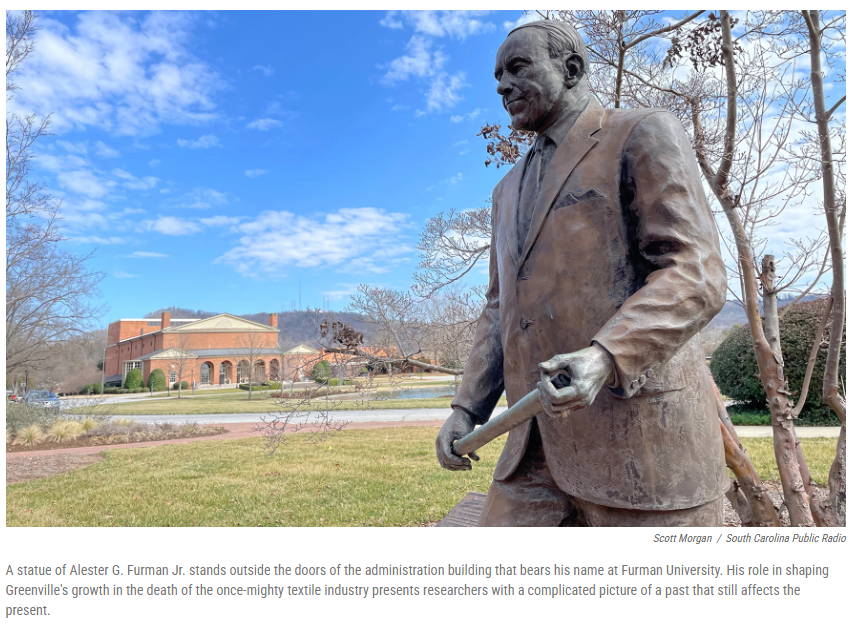SOUTH CAROlINA: Flag-Flying Flap Far From Finished
COLUMBIA, S.C. — The Confederate flag may have been removed from the S.C. State House grounds, but the aftermath from its removal is far from over.
If a commission tasked with deciding how to display the banner at the Confederate Relic Room proposes flying the flag again, Democratic legislators are prepared to fight, said state Rep. James Smith, D-Richland.
That plan was floated as lawmakers debated the flag’s removal in response to the racially motivated slaying of nine African Americans at a Charleston church this summer.
But for Smith and other Democrats, flying the flag is out of the question. It was ordered “furled forever” by Gen. Robert E. Lee and other Confederate leaders, he said.
“A flying flag needs to be maintained and replaced. It continues to have a life,” Smith said. “I don’t understand why those who say they are for heritage don’t understand that. It is a flag of a lost cause.”
Relic Room director Allen Roberson said Friday he and museum staff are not wedded to any plan at this point and could come up with entirely different ideas for displaying the flag as they work in coming months.
State Rep. Mike Pitts, R-Laurens, says he will be happy with whatever the commission decides. Pitts fought for a compromise to replace the Confederate flag with some other memorial to fallen Civil War soldiers.
Pitts said voters may have their own ideas in store for lawmakers whose seats are all up for re-election in next year’s campaign cycle. “(Y)ou’re going to see some legislators draw primary opposition because of the flag issue both ways.”
S.C.’s Mulvaney threatening budget showdown
Two years ago, South Carolina’s GOP members of Congress demanded the federal health care law known as Obamacare be gutted in the federal budget. When Democrats refused and the GOP didn’t budge, a stalemate shut the federal government down.
Another shutdown looms at the end of the month if lawmakers do not agree on a spending plan.
And federal budget daredevils have a new target: the abortion provider Planned Parenthood.
U.S. Rep. Mick Mulvaney, R-Indian Land, is leading an effort to cut federal money to Planned Parenthood. The nonprofit health care provider said it received $528 million from public sources last year, almost all for providing non-abortion services, such as mammograms and pap smears.
In a letter to House leaders, Mulvaney wrote that he and other conservatives will not vote for any federal spending plan that includes money for Planned Parenthood.
“Please know that we cannot and will not support any funding resolution – an appropriations bill, an omnibus package, a continuing resolution, or otherwise – that contains any funding for Planned Parenthood, including mandatory funding streams,” Mulvaney’s letter says.
2016 in SC
Eleven 2016 Republican presidential hopefuls will attend Heritage Action’s “Take Back America” forum Friday at Bon Secours Wellness Arena in Greenville. The event is co-hosted by Gov. Haley, who will join in asking the candidates questions, and former U.S. Sen. Jim DeMint of South Carolina. DeMint runs Heritage America’s sister group, the Heritage Foundation.
Candidates attending are: New York business mogul Trump; retired Maryland neurosurgeon Ben Carson; former Gov. Jeb Bush of Florida; U.S. Sens. Ted Cruz of Texas, Rand Paul of Kentucky and Marco Rubio of Florida; Govs. Chris Christie of New Jersey, Bobby Jindal of Louisiana and Scott Walker of Wisconsin; former Hewlett-Packard chief executive Carly Fiorina; and former U.S. Sen. Rick Santorum of Pennsylvania.
–scnow.com
###
VIRGINIA: Could Renaming Confederate Streets Help Healing?
Hume Avenue sits just off Alexandria’s Jefferson Davis Highway, behind the National Tire and Battery store. Like the highway, the three-block stretch of modest homes was named for a Confederate leader, although one not as well-known as the president of the Rebel states.
Now both streets could get new names, along with at least 31 others in Alexandria, the latest ripple in a national debate over the Confederacy that erupted after the shooting rampage at a black church in Charleston, S.C., allegedly carried out by white supremacist Dylann Roof.

Jefferson Davis Highway is seen from the roadside just before Occoquan Road in Woodbridge, Va. (Brittany Greeson/The Washington Post)
[The trailer where Dylann Roof found refuge]
The Alexandria City Council last week said it would appoint a citizen commission to recommend whether to rename streets that are linked to the Confederacy and whether to remove a statue of a grieving Confederate soldier on South Washington Street in Old Town. The council also voted to stop a longtime city practice of hoisting the Confederate flag from traffic-light poles near the statute on Confederate memorial days — joining a growing list of state and local governments that have reined in displays honoring the Confederacy.
On Hume, residents say the reconsideration of the city’s long-established Southern roots is complicated.
“I have mixed feelings,” said Maria Wasowski, who was gardening in her front yard on a recent morning. “People are used to the names of streets and don’t think of the associations [with Confederates]. Streets named for those who are major figures — that’s different.”
Her street was named for Frank Hume, a former Confederate soldier and self-described spy who served as a signal scout for Gen. J.E.B. Stuart. Wasowski said she did not consider it particularly offensive. But she would support renaming Jefferson Davis Highway and Beauregard Street in the West End, which honors Gen. Pierre G.T. Beauregard, who designed the Confederate battle flag.
[Complete list of streets named after Confederates in Alexandria]
Michael B. Wheatley, a music teacher who was leaving a student’s lesson on Hume on Friday morning, said he was in favor of renaming all the streets.
“We’re Yankees now,” he said. “It’s been a while. They lost. They should get over it already.”
But Jock Murray, a soft-spoken former employee of the Library of Congress who lives on the street, called the push to change street names “reactionary.”
“I don’t know why people harbor such intense feelings over something that happened 150 years ago,” he said.
[Alexandria’s fraught Southern history]
Since the church shooting, South Carolina has removed the Confederate flagfrom its statehouse grounds, and Virginia and Maryland said they would stop issuing specialty license plates that depict the flag.
A Confederate monument in Rockville, Md., spray-painted with “Black Lives Matter” in July, is now boxed up in plywood while county officials decide whether and where to move it.
Democratic Party activists in Alexandria and Arlington, in Maryland and elsewhere are mulling whether to continue to call their annual fundraisers Jefferson-Jackson dinners, after slave owners Thomas Jefferson and Andrew Jackson. Arlington County Democrats have appointed a committee to look into whether to rename its Jefferson-Jackson Day dinner, and their counterparts in Alexandria are doing the same.
“There’s a lot of concern about the antebellum issues of race and slavery,” Pat Murray, executive director of the Maryland Democratic Party, told the Baltimore Sun last week. “Certainly we’ve heard concerns about the fact that these two founders of the party had values that don’t really align with the modern party’s values of inclusiveness and diversity.”
But change has costs. Alexandria officials estimate that replacing the signs on Jefferson Davis Highway would cost $15,000 to $50,000, and the price for renaming the other 32 streets would be about $300,000. There are 30 additional streets in the city that may have been named for Confederates, but the historical office can’t say for sure.
Jim Becker, head of a Northern Virginia chapter of the Sons of the Confederacy, said renaming all the streets would be “narrow-minded.”
“It was a complicated time, and just like today, everyone had their own opinion,” Becker said of the Civil War period. “We should never forget where we came from and our country’s past, warts and all.”
[Backlash on flag is, to some, ‘an attack . . . on our heritage’]
Alexandria has a city charter, so it has the power to change the name of Jefferson Davis Highway if it wishes, the city attorney told the City Council last week. (Part of the road, where it splits into separate northbound and southbound segments are named Patrick and Henry streets.) But City Manager Mark Jinks suggested that Alexandria should coordinate any change with neighboring Arlington, because the highway also goes through that jurisdiction and because the county would have to seek power for such a change from the General Assembly.
Arlington County Board Chair Mary H. Hynes (D) said the board plans to seek such a change so that the highway can be called “something comfortable for the people who live and work on the street. Now it’s a hurtful name for our African American and incredibly diverse, welcoming community.”
She noted that in Fairfax County, Jefferson Davis Highway is known as Richmond Highway.
State Sen. Adam P. Ebbin (D-Alexandria) said he thought it would be “very challenging” to get a bill through the Republican-controlled legislature to allow the county to change highway names.
“Colleagues have asked me that if we do this, where will it stop? Some of them consider it to be erasing history,” said Ebbin, who lives within a quarter-mile of the highway. “I don’t intend to engage in an empty exercise with my colleagues.”
Back on Hume, resident Bridget Wendling said she had not been aware that her street was named for a Confederate soldier who settled in the city.
“I did not know that,” she said as she walked her Doberman and chatted with a neighbor. “I don’t know if I can articulate this, but I don’t think we should be celebrating things that offend people. But I don’t know that our street name offends people.”
–washingtonpost.com
###
VIRGINIA: Court Removes Portrait of Confederate General
For a lot of folks in Stuart, Va., eight miles north of the N.C. line, there are few things more offensive than disrespecting Confederate Major General J.E.B. Stuart.
Their town was named in honor of him, after all. Remembrances of his Civil War service dot the place. And a good number of residents still hold up Stuart, Stonewall Jackson and Robert E. Lee as sacrosanct war heroes.
Amid all this comes Martin F. Clark, a Phi Beta Kappa from Davidson College (class of ’81) and a best-selling author of four novels. He is also the presiding judge in Stuart.
This month, in a move that will win him very few friends, Clark announced that he had personally removed Stuart’s portrait from the Patrick County Circuit Court’s courtroom. County supervisors on Monday are expected to discuss what to do with the painting.
“The backlash,” the Martinsville Bulletin reports, “has been significant.”
Some residents speculate that next Clark will want to change the name of the town itself and remove monuments. History is history, they argue, and some politically correct judge shouldn’t try to erase it by removing the portrait of a man who has been dead for 150 years. The Mount Airy News speculates that Clark did it to sell more books.
The debate comes at a time of renewed awareness of the offensive nature of Confederate symbols to some residents, African-American and not. It features some of the same arguments that were heard on each side when South Carolina took down the Confederate flag following the murder of nine black church-goers in Charleston.
Clark, though, issued a 2,000-word explanation that describes, with uncommon eloquence and persuasiveness, why he removed the portrait.
“It is my goal – and my duty as a judge – to provide a trial setting that is perceived by all participants as fair, neutral and without so much as a hint of prejudice. Confederate symbols are, simply put, offensive to African-Americans, and this reaction is based on fact and clear, straightforward history. Bigotry saturates the Confederacy’s founding principles, its racial aspirations and its public pronouncements,” Clark wrote.
Having Stuart’s portrait in the courtroom creates an environment that some litigants might not find neutral, Clark said.
“By way of example, I’ll ask my fellow white Patrick Countians how they’d respond to this scenario: Imagine walking into a courtroom, your liberty at stake, and you discover a black judge, a black bailiff, a black commonwealth’s attorney, a black clerk and a black defense lawyer. You are the only white person there. You peer at the wall, and you see a picture of Malcom X – a Nation of Islam member who preached black superiority and demeaned the white race. What assumptions would you make about that courtroom, the judicial system and the black judge who allowed that portrait to remain on the wall? Would you feel certain that you’d receive fair, unbiased treatment with Malcolm X celebrated and honored in the place where your rights are being adjudicated? I would not, and that’s why General Stuart’s portrait has been removed.”
It was a courageous move, given its unpopularity. It might even cost Clark his job when his current term ends. He will ultimately be regarded as being on the right side of history, though, and I bet he’s sleeping better at night.
MARYLAND: NAACP Challenges confederate Statue
EASTON, Md. — Dozens of Talbot County residents have met to discuss their opinions on a statue that depicts a young soldier bearing the Confederate flag and lists the names of county residents who fought for the Confederacy.
The Star Democrat of Easton reports that the Talbot Association of Clergy and Laity on Wednesday held a public meeting in Easton, with 84 people in attendance to discuss the “Talbot Boys” statue. The statue has stood on the Talbot County Courthouse green for nearly a century.
In August, the Talbot Chapter of the NAACP met with the Talbot County Council to discuss the statue’s possible removal, sparking the public dialogue.
Confederate symbols have come under increased public scrutiny since the June 17 massacre of nine black worshippers at a church in Charleston, South Carolina.
–baltimore.cbslocal.com
###




